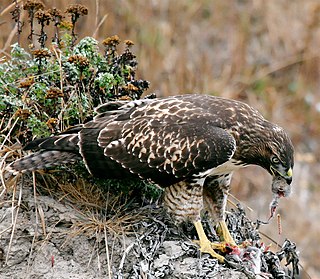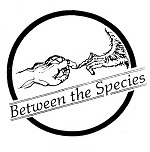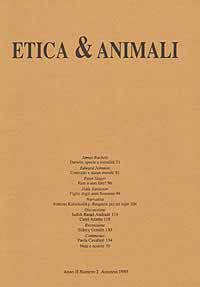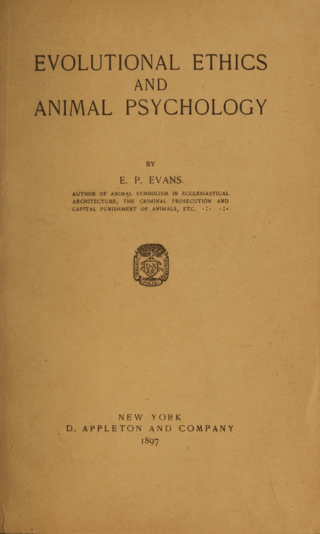
Wildlife refers to undomesticated animal species, but has come to include all organisms that grow or live wild in an area without being introduced by humans. Wildlife was also synonymous to game: those birds and mammals that were hunted for sport. Wildlife can be found in all ecosystems. Deserts, plains, grasslands, woodlands, forests, and other areas including the most developed urban areas, all have distinct forms of wildlife. While the term in popular culture usually refers to animals that are untouched by human factors, most scientists agree that much wildlife is affected by human activities. Some wildlife threaten human safety, health, property and quality of life. However, many wild animals, even the dangerous ones, have value to human beings. This value might be economic, educational, or emotional in nature.
In environmental philosophy, environmental ethics is an established field of practical philosophy "which reconstructs the essential types of argumentation that can be made for protecting natural entities and the sustainable use of natural resources." The main competing paradigms are anthropocentrism, physiocentrism, and theocentrism. Environmental ethics exerts influence on a large range of disciplines including environmental law, environmental sociology, ecotheology, ecological economics, ecology and environmental geography.
Anthropocentrism is the belief that human beings are the central or most important entity on the planet. The term can be used interchangeably with humanocentrism, and some refer to the concept as human supremacy or human exceptionalism. From an anthropocentric perspective, humankind is seen as separate from nature and superior to it, and other entities are viewed as resources for humans to use.
Ecocentrism is a term used by environmental philosophers and ecologists to denote a nature-centered, as opposed to human-centered, system of values. The justification for ecocentrism usually consists in an ontological belief and subsequent ethical claim. The ontological belief denies that there are any existential divisions between human and non-human nature sufficient to claim that humans are either (a) the sole bearers of intrinsic value or (b) possess greater intrinsic value than non-human nature. Thus the subsequent ethical claim is for an equality of intrinsic value across human and non-human nature, or biospherical egalitarianism.
Biocentrism, in a political and ecological sense, as well as literally, is an ethical point of view that extends inherent value to all living things. It is an understanding of how the earth works, particularly as it relates to its biosphere or biodiversity. It stands in contrast to anthropocentrism, which centers on the value of humans. The related ecocentrism extends inherent value to the whole of nature.
Environmental social science is the broad, transdisciplinary study of interrelations between humans and the natural environment. Environmental social scientists work within and between the fields of anthropology, communication studies, economics, geography, history, political science, psychology, and sociology; and also in the interdisciplinary fields of environmental studies, human ecology and political ecology, social epidemiology, among others.

The Journal of Animal Ethics (JAE) is a multidisciplinary peer-reviewed journal which explores the ethical relationship between humans and animals. It is published by the University of Illinois Press, in partnership with the Ferrater Mora Oxford Centre for Animal Ethics. The journal is co-edited by Andrew and Clair Linzey. It was formerly co-edited with Priscilla Cohn. The journal has been published annually since 2011. Its content consists of scholarly articles, reviews and argument pieces.

Wild animal suffering is the suffering experienced by non-human animals living outside of direct human control due to harms, such as disease, injury, parasitism, starvation and malnutrition, dehydration, weather conditions, natural disasters, and killings by other animals, as well as psychological stress. Some estimates indicate that these individual animals make up the vast majority of animals in existence. An extensive amount of natural suffering has been described as an unavoidable consequence of Darwinian evolution, as well as the pervasiveness of reproductive strategies, which favor producing large numbers of offspring, with a low amount of parental care and of which only a small number survive to adulthood, the rest dying in painful ways, has led some to argue that suffering dominates happiness in nature.
Siobhan O'Sullivan was an Australian political scientist and political theorist. She was an associate professor in the School of Social Sciences, University of New South Wales. Her research focused, among other things, on animal welfare policy and the welfare state. She was the author of Animals, Equality and Democracy and a coauthor of Getting Welfare to Work and Buying and Selling the Poor. She co-edited Contracting-out Welfare Services and The Political Turn in Animal Ethics. She was the founding host of the regular animal studies podcast Knowing Animals.

Political Animals and Animal Politics is a 2014 edited collection published by Palgrave Macmillan and edited by the green political theorists Marcel Wissenburg and David Schlosberg. The work addresses the emergence of academic animal ethics informed by political philosophy as opposed to moral philosophy. It was the first edited collection to be published on the topic, and the first book-length attempt to explore the breadth and boundaries of the literature. As well as a substantial introduction by the editors, it features ten sole-authored chapters split over three parts, respectively concerning institutional change for animals, the relationship between animal ethics and ecologism, and real-world laws made for the benefit of animals. The book's contributors were Wissenburg, Schlosberg, Manuel Arias-Maldonado, Chad Flanders, Christie Smith, Clemens Driessen, Simon Otjes, Kurtis Boyer, Per-Anders Svärd, and Mihnea Tanasescu. The focus of their individual chapters varies, but recurring features include discussions of human exceptionalism, exploration of ways that animal issues are or could be present in political discourse, and reflections on the relationship between theory and practice in politics.
Clare Palmer is a British philosopher, theologian and scholar of environmental and religious studies. She is known for her work on environmental and animal ethics. She was appointed as a professor in the Department of Philosophy at Texas A&M University in 2010. She had previously held academic appointments at the Universities of Greenwich, Stirling, and Lancaster in the United Kingdom, and Washington University in St. Louis in the United States, among others.

Between the Species: A Journal for the Study of Philosophy and Animals is a peer-reviewed academic journal devoted to philosophical examinations of human relationships with other animals. It is, in part, a continuation of Ethics & Animals (E&A), a journal which ran from 1980 to 1984. Between the Species was founded as a print journal in 1985, published by the Schweitzer Center of the San Francisco Bay Institute/Congress of Cultures. The print version ceased publication in 1996. It was revived as an open access online-only journal in 2002. It is published by the Philosophy Department and Digital Commons at the California Polytechnic State University; Joseph Lynch is the current editor-in-chief.

Gary Edward Varner was an American philosopher specializing in environmental ethics, philosophical questions related to animal rights and animal welfare, and R. M. Hare's two-level utilitarianism. At the time of his death, he was an emeritus professor in the department of philosophy at Texas A&M University; he had been based at the university since 1990. He was educated at Arizona State University, the University of Georgia, and the University of Wisconsin–Madison; at Madison, where he was supervised by Jon Morline, he wrote one of the first doctoral theses on environmental ethics. Varner's first monograph was In Nature's Interests?, which was published by Oxford University Press in 1998. In the book, Varner defended a form of biocentric individualism, according to which all living entities have morally considerable interests.

Óscar Horta Álvarez is a Spanish animal activist and moral philosopher who is a professor in the Department of Philosophy and Anthropology at the University of Santiago de Compostela (USC) and one of the co-founders of the organization Animal Ethics. He is known for his work in animal ethics, especially around the problem of wild animal suffering. He has also worked on the concept of speciesism and on the clarification of the arguments for the moral consideration of nonhuman animals. In 2022, Horta published his first book in English, Making a Stand for Animals.

Philosophy of ecology is a concept under the philosophy of science, which is a subfield of philosophy. Its main concerns centre on the practice and application of ecology, its moral issues, and the intersectionality between the position of humans and other entities. This topic also overlaps with metaphysics, ontology, and epistemology, for example, as it attempts to answer metaphysical, epistemic and moral issues surrounding environmental ethics and public policy.
Animal Ethics is a nonprofit organization formed to promote discussion and debate around issues in animal ethics and to provide information and resources for animal advocates. They also do outreach work in several countries on the issue of speciesism. Their aim is to create a world where moral consideration is extended to all sentient beings. The organization's website covers topics such as speciesism, sentience, veganism and wild animal suffering and has content translated into several languages.
Eva Haifa Giraud is a cultural and critical theorist and a scholar of media studies and feminist science studies whose work concerns activism and non-anthropocentric theory. She is presently a senior lecturer in the Department of Sociological Studies at the University of Sheffield. Her 2019 monograph What Comes After Entanglement? Activism, Anthropocentrism, and an Ethics of Exclusion was published by Duke University Press; her second sole-authored book, Veganism: Politics, Practice and Theory, was published in 2021 by Bloomsbury.
Catia Faria is a Portuguese moral philosopher and activist for animal rights and feminism. She is assistant professor in Applied Ethics at the Complutense University of Madrid, and is a board member of the UPF-Centre for Animal Ethics. Faria specialises in normative and applied ethics, especially focusing on how they apply to the moral consideration of non-human animals. In 2022, she published her first book, Animal Ethics in the Wild: Wild Animal Suffering and Intervention in Nature.

Etica & Animali was an academic journal of philosophy published quarterly from 1988 to 1998, covering animal ethics. It was established and edited by the Italian philosopher Paola Cavalieri.

Evolutional Ethics and Animal Psychology is an 1897 book by the American scholar and early animal rights advocate Edward Payson Evans. It is an in-depth exploration of the intersection between ethical theory and animal psychology, with a particular focus on the rights of animals and the moral obligations humans have toward them.










